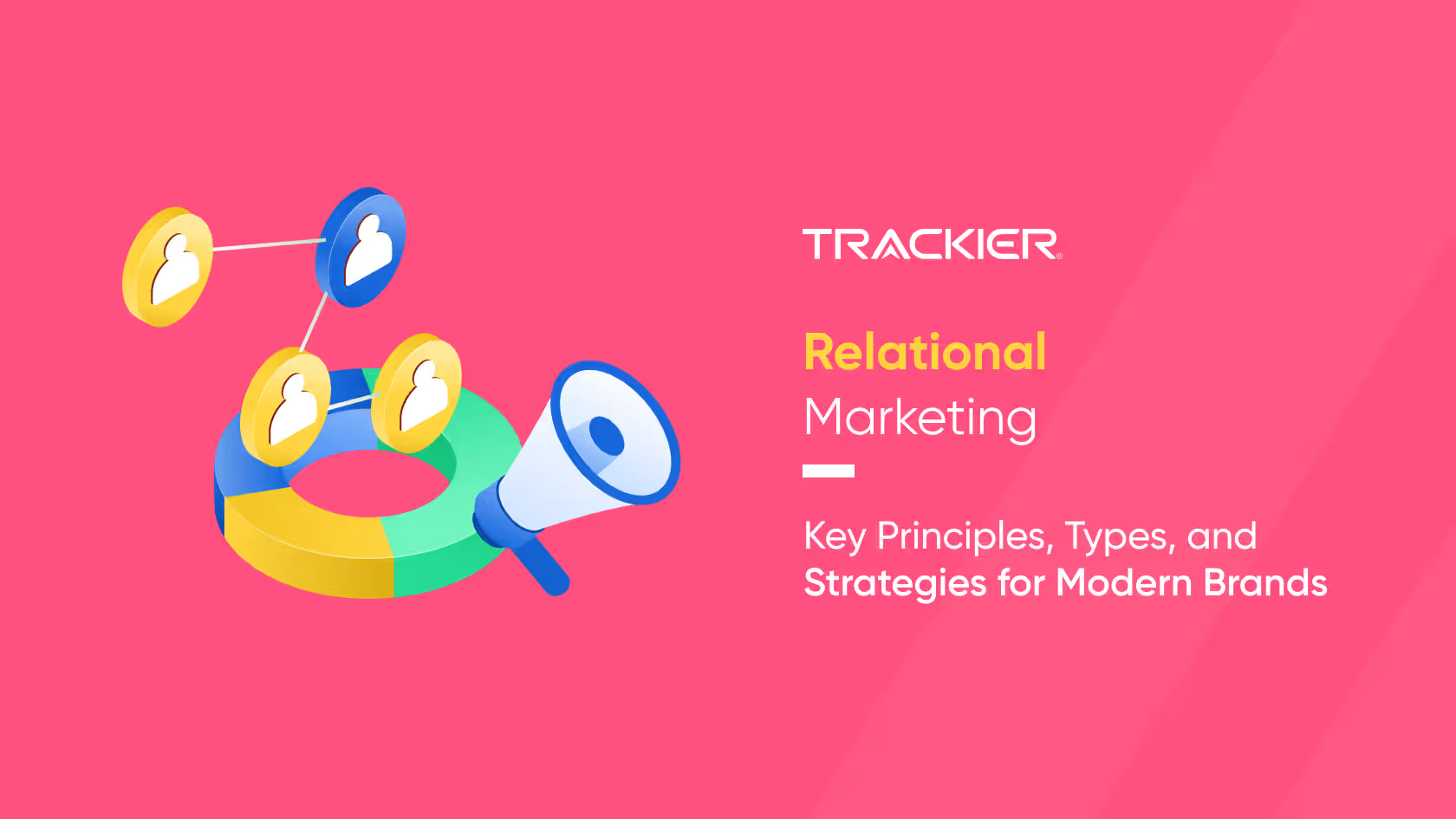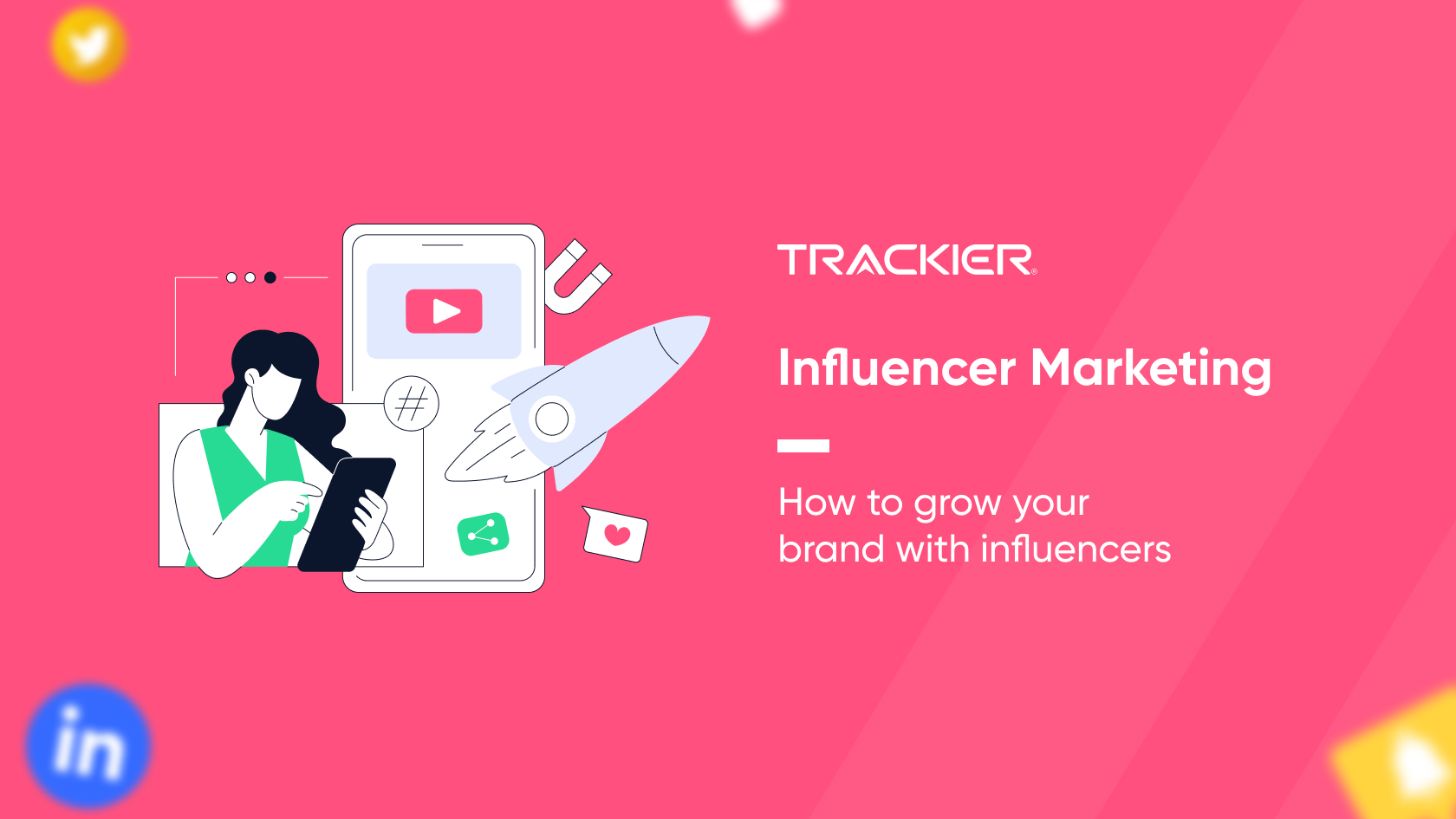For a long time, lifestyle and consumer-focused brands used influencer marketing to increase their sales. But in 2024, companies realize that they have to use influencer marketing in B2B industry. In fact, more than 70% of B2B marketers increased their marketing budget towards influencer marketing last year.
However, the B2B buying cycle is more complex and needs to involve various stakeholders compared to the B2C brand, where decisions are made quickly. That is why influencers have a key role when brands have to build trust and communicate with their potential customers in a more authentic way.
But, B2B businesses face many challenges while running influencer campaigns, including measuring their performance, verifying results, and staying within budget can be difficult without the right tools.
They need to use a performance marketing software like Trackier that helps businesses streamline their influencer and affiliate marketing efforts. It provides real-time tracking, automated reporting, fraud prevention, and many more.
What is Influencer Marketing in B2B?
Influencer marketing for B2B means working with the right people or groups who can influence your target audience. These influencers will increase your revenue by promoting your products or services on their social media account with their followers.
B2B influencers are usually experts in their niche (they could be industry analysts, company leaders, consultants, or popular content creators) when compared to B2C, where influencers are mostly celebrities or social media stars.
For example, if you sell software for banks, your ideal influencers will be a well-known banking consultant or a tech analyst who writes about banking software. Their followers will listen to their advice (because they trust them), which will eventually boost your revenue.
Why B2B Businesses Should Leverage Influencer Marketing?
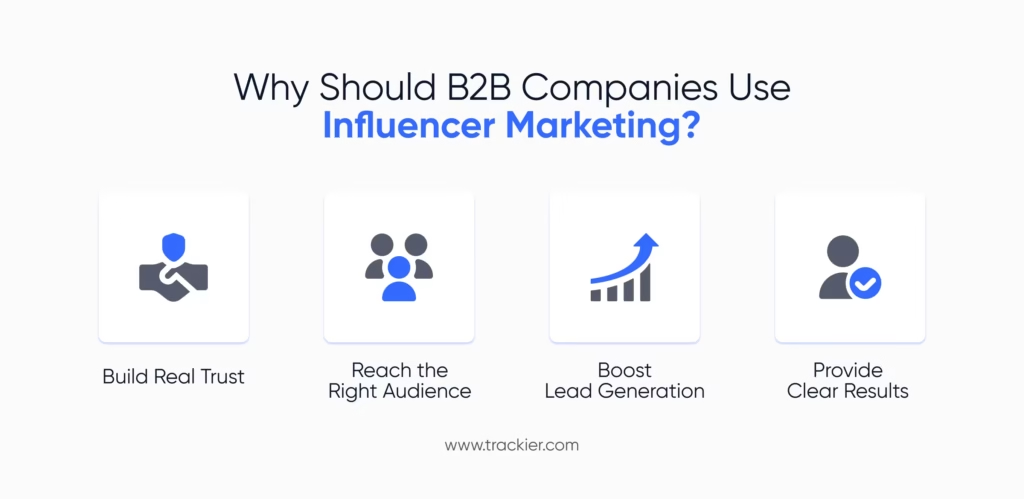
As we said before, the sales process in B2B is longer when compared to B2C. There are lots of stakeholders involved in making the buying decision because it can impact their entire companies. Here are some key reasons why B2B businesses should work with influencers:
1. Build Real Trust
In B2B, the most important factor is building trust. People will get more influenced if they get a recommendation from who they respect (it could be some individuals or organizations who give the ratings). Influencers could increase your trust factor by creating genuine content.
2. Reach the Right Audience
B2B has a very small number of small or specific groups of individuals. An expert influencer could have those followers whom you want to target. So, when you collaborate with these influencers, your brand message will reach the right audience (decision-makers).
3. Boost Lead Generation
The best influencer campaigns do not just get attention, they also get leads for the businesses. Influencer marketing can help your potential customers understand your product’s value and convince them to buy faster.
4. Provide Clear Results
With the right tools, you can see exactly how your influencer marketing campaigns are working. Trackier provides you with real-time data on clicks, conversions, and sales. It also helps prevent fake leads or clicks, making sure your marketing budget goes to get better ROI.
Different Types of Influencers in B2B
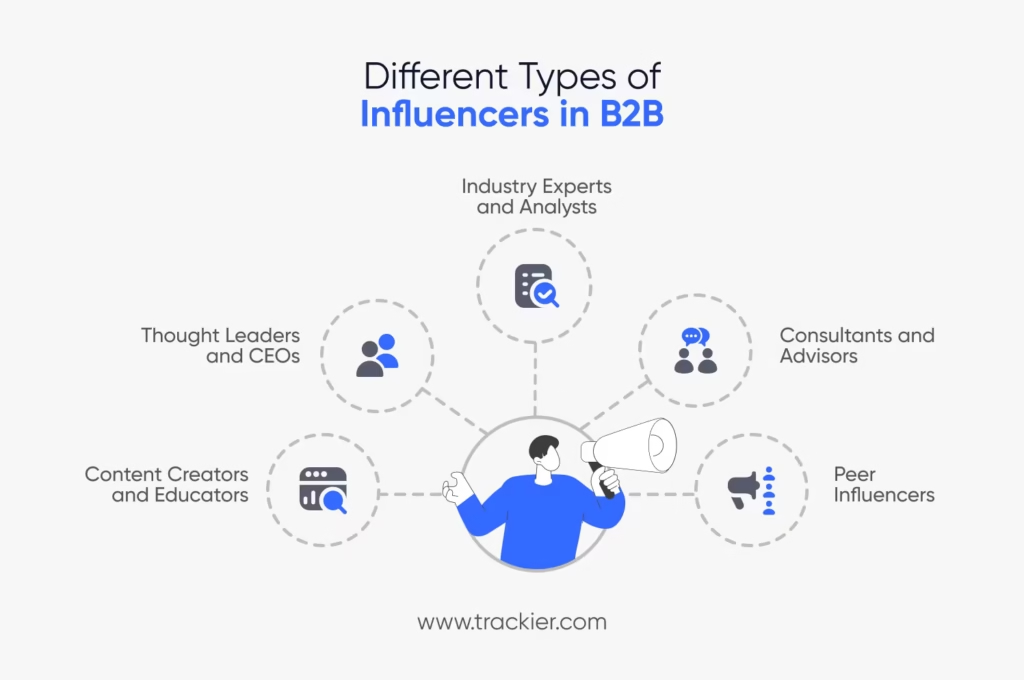
Not all of the influencers will be the right fit for your brand. In the B2B space, you have to find many relevant influencers who can help you increase revenue.
- Industry Experts and Analysts: These individuals know your industry very well. They write comprehensive reports and offer advice that many B2B companies trust.
- Thought Leaders and CEOs: These are leaders in your industry, like company founders, CEOs, or experts who talk about the latest trends and ideas.
- Content Creators and Educators: These include bloggers, podcasters, and video creators who create easy-to-understand content about the industry or products for your target audience.
- Consultants and Advisors: These influencers work directly with companies as advisors. Their recommendations often lead to business decisions.
- Peer Influencers: These are your customers or industry peers who share honest reviews or success stories of the products or services they have used. They can influence their network through word-of-mouth marketing.
How to Build a Successful B2B Influencer Marketing Strategy?
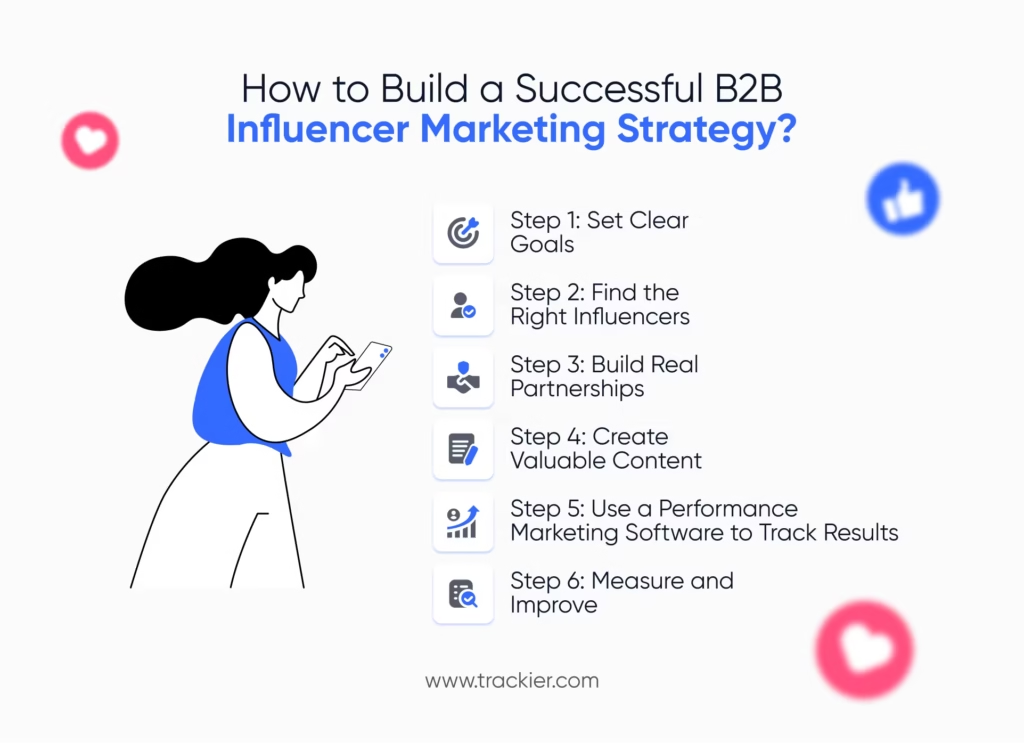
Creating the best influencer marketing strategy for B2B brands takes time and some considerations. Here is a simple step-by-step guide to help you get started:
Step 1: Set Clear Goals
Before you start to build a plan, decide what you want to achieve, because your goals will align with the entire campaign. It could be:
- Do you want to get more leads?
- Build brand awareness?
- Increase sales?
Step 2: Find the Right Influencers
Before identifying your right influencers, make an audience profile and analyze where your target audience spends most of their time, whether on LinkedIn, industry blogs, YouTube, or niche communities.
Then you can use influencer discovery tools to find the best influencer who matches your audience. Look at their engagement levels, quality of their audience, and their past collaborations. Also, always work with influencers whose content, tone, and values align with your brand.
Step 3: Build Real Partnerships
Build real partnerships with your influencers rather than just paying for a cost. Collaborate with your influencers to create the best content together. You can also invite them to some events or ask for their honest feedback on working with your brand.
Step 4: Create Valuable Content
Help your influencers create useful content that should be interesting for your audience in the form of blogs, videos, webinars, or case studies. If the content solves the real problems and educates your audiences, it will get the most attention.
Step 5: Use a Performance Marketing Software to Track Results
Managing your influencer marketing campaigns can be very challenging. You should use Trackier, which helps you track every click, lead, and sale that comes from your influencer’s efforts.
Step 6: Measure and Improve
Look at the data regularly to identify what is working and what is not. You can use these insights to improve your influencer marketing campaigns. You can scale your best influencer partnerships to get the best results.
Conclusion
Influencer marketing helps businesses to build trust, reach the right audience, and get the best leads. But the success of influencer marketing partnerships depends on how brands choose influencers and manage them.
Because finding an influencer is one thing, but working closely with them is a different thing. Also, it is necessary to track their activities, like which campaigns they are working on or how their content resonates with your target audience.
For this, businesses can use performance marketing software to get comprehensive data, real-time reporting, and much more.
FAQs
1. What is B2B influencer marketing, and how is it different from B2C?
B2B influencer marketing refers to working with experts, consultants, analysts, or similar thought leaders who influence decision-makers in a business context. B2B influencers are not necessarily million-follower celebrities, like B2C influencer marketing. Especially in professional contexts, B2B influencers care about engaging niche audiences instead of general audiences, and they focus on building credibility, trust, expertise, and influencing large, high-value buying decisions across long, complex sales cycles. In B2B contexts, professional influencers can drive brand credibility and offer quality leads.
2. Why should B2B businesses invest in influencer marketing?
B2B buying decisions typically take longer and involve multiple stakeholders, making trust and credibility vital. Influencer marketing helps brands build that trust by amplifying respected voices within the industry; it ensures messages are delivered to the proper audience, often senior executives and decision-makers, and it speeds up lead generation. Additionally, with performance marketing software like Trackier, businesses can track clicks, leads, and conversions in real-time, providing added assurance that their return on investment with influencers is clear.
3. What types of influencers are most effective in B2B campaigns?
Effective influencers in B2B influence depend on industry, audience, and the kind of influencer. Industry analysts and experts who provide incremental trust through research, thought leaders or CEOs who share insights about new trends, content creators who might be podcasters or bloggers who simplify complex topics, and consultants or peer influencers who provide recommendations. Unlike B2C, influencers in B2B are expected to focus their influence on credibility, influence, and data expertise, without worrying about popularity. Finding the right mix and job will ensure that your brand creates authentic connections with different decision makers and maps to both meaningful and measurable business results.
4. How can B2B brands build a successful influencer marketing strategy?
A successful B2B influencer marketing strategy requires clear goals, the right influencer selection, and genuine partnerships. Brands should begin by defining whether they want awareness, leads, or sales. Next, they must identify influencers whose audience overlaps with their target buyers. Building real partnerships, not just transactional campaigns, creates authentic content such as webinars, case studies, or thought leadership articles. By using performance marketing software like Trackier, brands can track results, measure engagement, and optimize continuously. Consistency and authenticity are the keys to long-term success.
5. How can B2B marketers measure the success of influencer marketing campaigns?
Measuring B2B influencer campaigns is challenging without proper tools. Metrics go beyond likes and shares; they include lead generation, conversions, pipeline influence, and overall ROI. Performance marketing software such as Trackier helps marketers track every click, lead, and sale, while filtering out fraudulent activity. By analyzing engagement quality, content reach, and the revenue attributed to influencer activities, businesses can determine which influencers deliver real value. Regular measurement and optimization ensure campaigns remain effective, scalable, and aligned with business goals.


